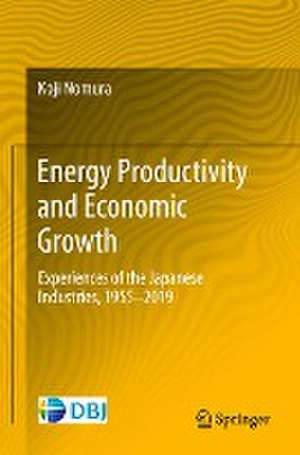Energy Productivity and Economic Growth: Experiences of the Japanese Industries, 1955–2019
Autor Koji Nomuraen Limba Engleză Paperback – 3 ian 2024
| Toate formatele și edițiile | Preț | Express |
|---|---|---|
| Paperback (1) | 779.89 lei 43-57 zile | |
| Springer Nature Singapore – 3 ian 2024 | 779.89 lei 43-57 zile | |
| Hardback (1) | 787.15 lei 22-36 zile | |
| Springer Nature Singapore – 2 ian 2023 | 787.15 lei 22-36 zile |
Preț: 779.89 lei
Preț vechi: 951.08 lei
-18% Nou
Puncte Express: 1170
Preț estimativ în valută:
149.25€ • 154.87$ • 124.75£
149.25€ • 154.87$ • 124.75£
Carte tipărită la comandă
Livrare economică 17-31 martie
Preluare comenzi: 021 569.72.76
Specificații
ISBN-13: 9789811964961
ISBN-10: 9811964963
Ilustrații: XXII, 246 p. 85 illus., 74 illus. in color.
Dimensiuni: 155 x 235 mm
Greutate: 0.38 kg
Ediția:1st ed. 2022
Editura: Springer Nature Singapore
Colecția Springer
Locul publicării:Singapore, Singapore
ISBN-10: 9811964963
Ilustrații: XXII, 246 p. 85 illus., 74 illus. in color.
Dimensiuni: 155 x 235 mm
Greutate: 0.38 kg
Ediția:1st ed. 2022
Editura: Springer Nature Singapore
Colecția Springer
Locul publicării:Singapore, Singapore
Cuprins
Energy and Economic Growth.- Industry Origins of Energy Productivity Improvement.- Real Energy Cost.- Energy Productivity and Overall Efficiency.- Indirect Import of Electricity.- Toward the Energy Transition of Japan.
Notă biografică
Koji Nomura is Professor at Keio Economic Observatory, Keio University, Tokyo. Nomura received a BA in 1993, an MA in 1995, and a Ph.D. in 2005 from Keio University. He has previously served as an assistant professor (1996–2003) and associate professor (2003–2017) at Keio University; a CBG fellow at JFK School of Government, Harvard University (2003–2005); and an economist at the OECD (2006–2007); a faculty fellow at the Research Institute of Economy, Trade, and Industry (2013–2019); a consultant for the United Nations Department of Economic and Social Affairs (2015–2016); and chief research officer at The 21st Century Public Policy Institute, Keidanren (2019–2020). He currently works as a project manager for the APO Productivity Database at the Asian Productivity Organization (2007–present); a visiting senior fellow at the Research Institute of Capital Formation, Development Bank of Japan (2009–present); and a visiting fellow at the Economic Social Research Institute, Cabinet Office, Government of Japan (2005–2008 and 2012–present). His research focuses on economic measurement, productivity analysis, and energy economics. His book, Measurement of Capital and Productivity in Japan (in Japanese), published by Keio University Press in 2004, was awarded the 48th Nikkei Prize for Excellent Books in Economic Science. He received the Keio Award in 2005.
Textul de pe ultima copertă
Energy costs in the economy amount to only a few percent of gross domestic product, but their importance to economic growth is much greater than their apparent number. Energy is used in almost all production and consumption activities, and energy price changes induce significant spillover effects throughout the economic system. More importantly, stable and affordable access to energy is a critical factor in determining the rate of capital accumulation in a domestic economy and, hence, labor productivity growth. The expansion of production per hour worked is achieved by using more and higher quality capital, which requires more energy to operate. This book aims to provide robust observational facts on energy productivity improvement (EPI) and to analyze the mechanisms of EPI achieved in Japan’s economic growth from 1955 to 2019. Linking the productivity account with energy statistics enables us to attempt not only to develop a better indicator of energy productivity but also toevaluate the EPI with other significant changes in the production process, such as capital productivity, labor productivity, and even the overall efficiency measured in terms of total factor productivity. This book is a valuable resource for researchers and policymakers seeking to understand the role of energy throughout the economy and for economic planners seeking to ensure the efficient use of energy now and into the future.
Caracteristici
Furnishes a detailed analysis of the industry-level performance of energy productivity in Japan Provides insight into the mechanisms of energy efficiency improvement from a perspective of productivity Explains the role of industrial structural changes in the improvement of energy efficiency
